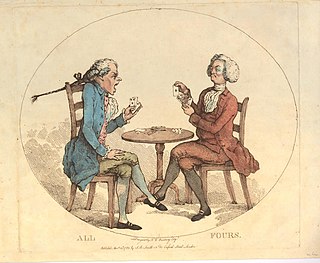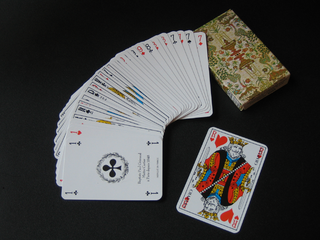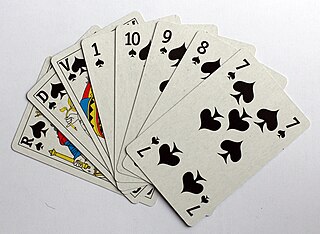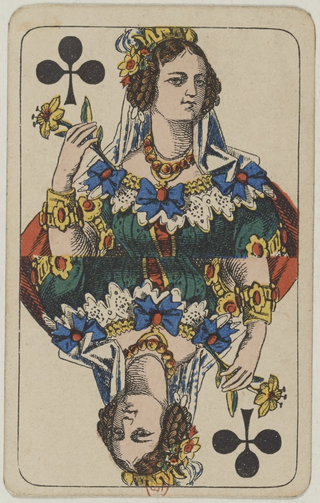Related Research Articles

Oh hell or contract whist is a trick-taking card game of British origin in which the object is to take exactly the number of tricks bid. It was first described by B. C. Westall around 1930 and originally called oh! well. It was said to have been introduced into America via the New York clubs in 1931. Phillips and Westall describe it as "one of the best round games".

A trick-taking game is a card or tile-based game in which play of a hand centers on a series of finite rounds or units of play, called tricks, which are each evaluated to determine a winner or taker of that trick. The object of such games then may be closely tied to the number of tricks taken, as in plain-trick games such as contract bridge, whist, and spades, or to the value of the cards contained in taken tricks, as in point-trick games such as pinochle, the tarot family, briscola, and most evasion games like hearts. Trick-and-draw games are trick-taking games in which the players can fill up their hands after each trick. In most variants, players are free to play any card into a trick in the first phase of the game, but must follow suit as soon as the stock is depleted. Trick-avoidance games like reversis or polignac are those in which the aim is to avoid taking some or all tricks.

Whist is a classic English trick-taking card game which was widely played in the 18th and 19th centuries. Although the rules are simple, there is scope for strategic play.

All fours is a traditional English card game, once popular in pubs and taverns as well as among the gentry, that flourished as a gambling game until the end of the 19th century. It is a trick-taking card game that was originally designed for two players, but developed variants for more players. According to Charles Cotton, the game originated in Kent, but spread to the whole of England and eventually abroad. It is the eponymous and earliest recorded game of a family that flourished most in 19th century North America and whose progeny include pitch, pedro and cinch, games that even competed with poker and euchre. Nowadays the original game is especially popular in Trinidad and Tobago, but regional variants have also survived in England. The game's "great mark of distinction" is that it gave the name 'jack' to the card previously known as the knave.

Euchre or eucre is a trick-taking card game commonly played in Australia, Canada, Great Britain, New Zealand, and the Midwestern United States. It is played with a deck of 24, 25, 28, or 32 standard playing cards. There are normally four players, two on each team, although there are variations for two to nine players.
Ninety-nine is a card game for 2, 3, or 4 players. It is a trick-taking game that can use ordinary French-suited cards. Ninety-nine was created in 1967 by David Parlett; his goal was to have a good 3-player trick-taking game with simple rules yet great room for strategy.
Marjapussi is a traditional Finnish trick taking game for 4 players playing in 2 partnerships and is one of the Mariage family, its key feature being that the trump suit is determined in the middle of the play by declaring a marriage. There are variants of marjapussi for two and three players.
Pedro is an American trick-taking card game of the all fours family based on auction pitch. Its most popular variant is known as cinch, double Pedro or high five which was developed in Denver, Colorado, around 1885 and soon regarded as the most important American member of the all fours family. Although it went out of fashion with the rise of auction bridge, it is still widely played on the western coast of the United States and in its southern states, being the dominant game in some locations in Louisiana. Forms of the game have been reported from Nicaragua, the Azores, Niobe NY, Italy, and Finland. The game is primarily played by four players in fixed partnerships, but can also be played by 2–6 individual players.
Pitch is an American trick-taking game equivalent to the British blind all fours which, in turn, is derived from the classic all fours. Historically, pitch started as "blind all fours", a very simple all fours variant that is still played in England as a pub game. The modern game involving a bidding phase and setting back a party's score if the bid is not reached came up in the middle of the 19th century and is more precisely known as auction pitch or setback.
Smear is a North-American trick-taking card game of the all fours group, and a variant of pitch (setback). Several slightly different versions are played in Michigan, Minnesota, Northern and Central Iowa, Wisconsin and also in Ontario, Canada.

Manille is a Catalan French trick-taking card game which uses a 32 card deck. It spread to the rest of France in the early 20th century, but was subsequently checked and reversed by the expansion of belote. It is still popular in France and the western part of Belgium.
Phat is an English trick-taking partnership card game descended from the 17th century game of all fours. It is closely related to the British and Irish game of Don and may have been derived from it during the First World War. Phat is still played in England in Herefordshire, Cheshire, Staffordshire, Norfolk and Suffolk. In Scotland it is known around Motherwell and Wishaw.

The card game of Euchre has many variants, including those for two, three, five or more players. The following is a selection of the Euchre variants found in reliable sources.

The following is a glossary of terms used in card games. Besides the terms listed here, there are thousands of common and uncommon slang terms. Terms in this glossary should not be game-specific, but apply to a wide range of card games played with non-proprietary packs. It should not include terms solely related to casino or banking games. For glossaries that relate primarily to one game or family of similar games, see Game-specific glossaries.
Réunion, Reunion or Vereinigungsspiel is an historical German point-trick game for three players which, despite its French name, appears to have originated in the central Rhineland and lowland areas to the east. It is a 10-card game of the ace–ten family and uses a 32-card French-suited piquet pack or 32-card Skat pack. Players who cannot follow suit must trump. Otherwise the game can be described as a simplified version of Skat, but is also reminiscent of Euchre with its two permanent top trumps, the Right and Left Bowers.

Triomphe, once known as French ruff, is a card game dating from the late 15th century. It most likely originated in France or Spain and later spread to the rest of Europe. When the game arrived in Italy, it shared a similar name with the pre-existing game and deck known as trionfi; probably resulting in the latter becoming renamed as Tarocchi (tarot). While trionfi has a fifth suit that acts as permanent trumps, triomphe randomly selects one of the existing four suits as trumps. Another common feature of this game is the robbing of the stock. Triomphe became so popular that during the 16th century the earlier game of trionfi was gradually renamed tarocchi, tarot, or tarock. This game is the origin of the English word "trump" and is the ancestor of many trick-taking games like Euchre and Whist. The earliest known description of Triomphe was of a point-trick game, perhaps one of the earliest of its type; later, the name was applied to a plain-trick game.

Binokel is a card game for two to eight players that originated in Switzerland as Binocle, but spread to the German state of Württemberg, where it is typically played with a Württemberg pattern pack. It is still popular in Württemberg, where it is usually played in groups of three or four as a family game rather than in the pubs. In three-hand games, each player competes for himself, while in four-hand games, known as Cross Binokel (Kreuzbinokel), two teams are formed with partners sitting opposite one another. The game was introduced to America by German immigrants in the first half of the 20th century, where it developed into the similar game of pinochle. Binocle was still played in Switzerland in 1994. In south Germany, the game is sometimes called by its Swabian name, Benoggl.

Norseman's knock or Norrlandsknack is a classic Swedish card game for 3 to 5 players, known since the mid-1800s. It is traditionally played for money. The game is about winning as many tricks as possible and above all not being completely left without a trick.

Penneech or peneech, sometimes called penicth, is an unusual historical English card game for two players played with hands of seven cards. English point-trick games are rare anyway, but the unique feature of this game is that the trump suit changes with each trick. Parlett describes it as a "jolly little two-hander".

Sjavs is a Danish card game of the Schafkopf family that is played in two main variants. In Denmark, it is a 3-player game, played with a shortened pack of 20 cards; in the Faroe Islands, where it is very popular, it is a four-hand, partnership game using a standard piquet pack of 32 cards.
References
- Chicago Cinch Club (1890), The Laws and Etiquette of Cinch, Chicago
{{citation}}: CS1 maint: location missing publisher (link). - Foster, Robert Frederick (1897), Foster's Complete Hoyle, London and New York
{{citation}}: CS1 maint: location missing publisher (link). - McLeod, John (ed.), "All Fours Group", Card Games website .
- Parlett, David (2008), "High-low-Jack family", The Penguin Book of Card Games (3rd ed.), Penguin Books, pp. 175–188, ISBN 978-0-14-103787-5 .
- United States Playing Card Company, "Cinch", Game Rules.
- Snyder, Edgar C. (1890). High Five: Rules for Playing the Single, Double and Progressive Games. Omaha, NE: Chase & Eddy.